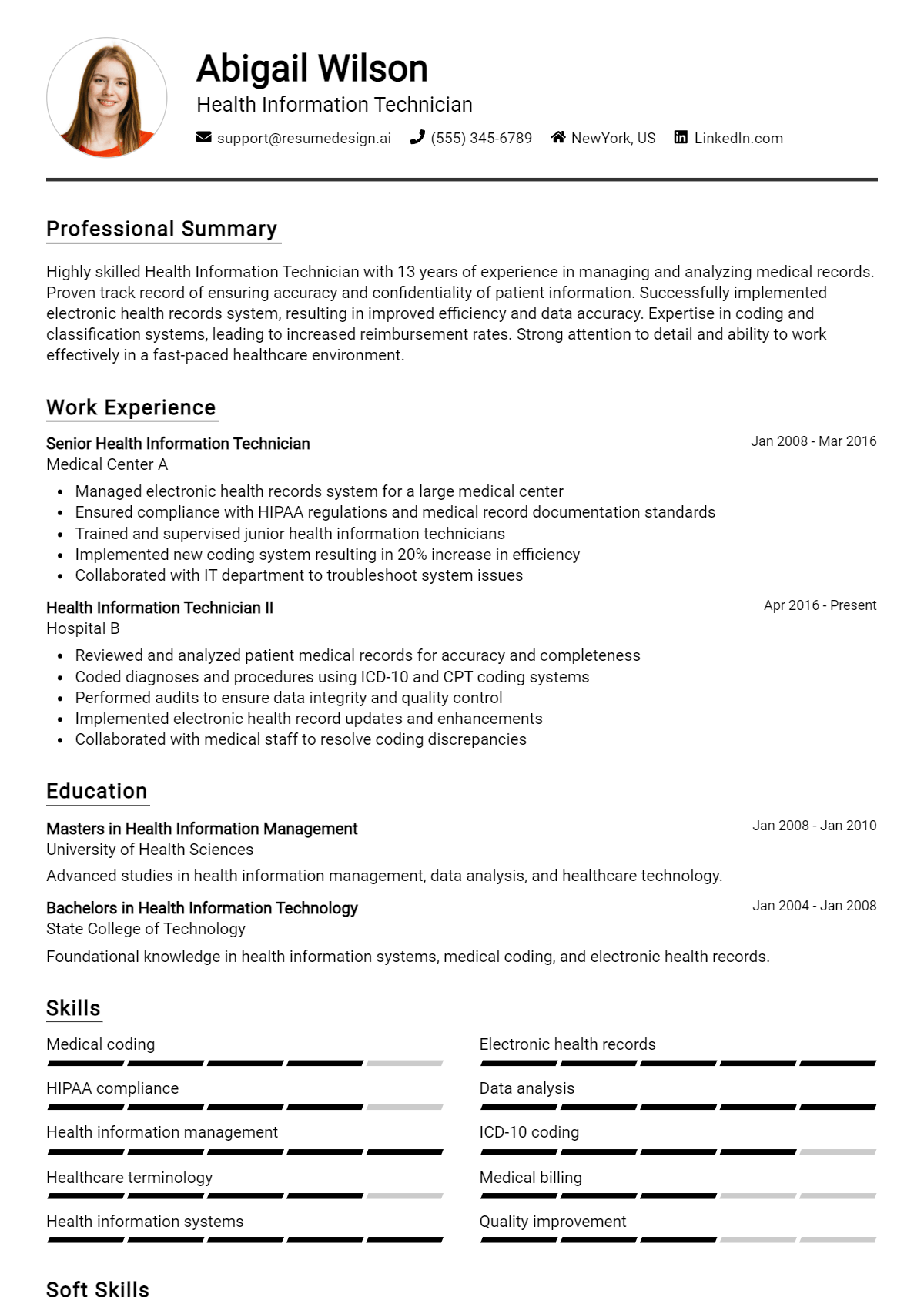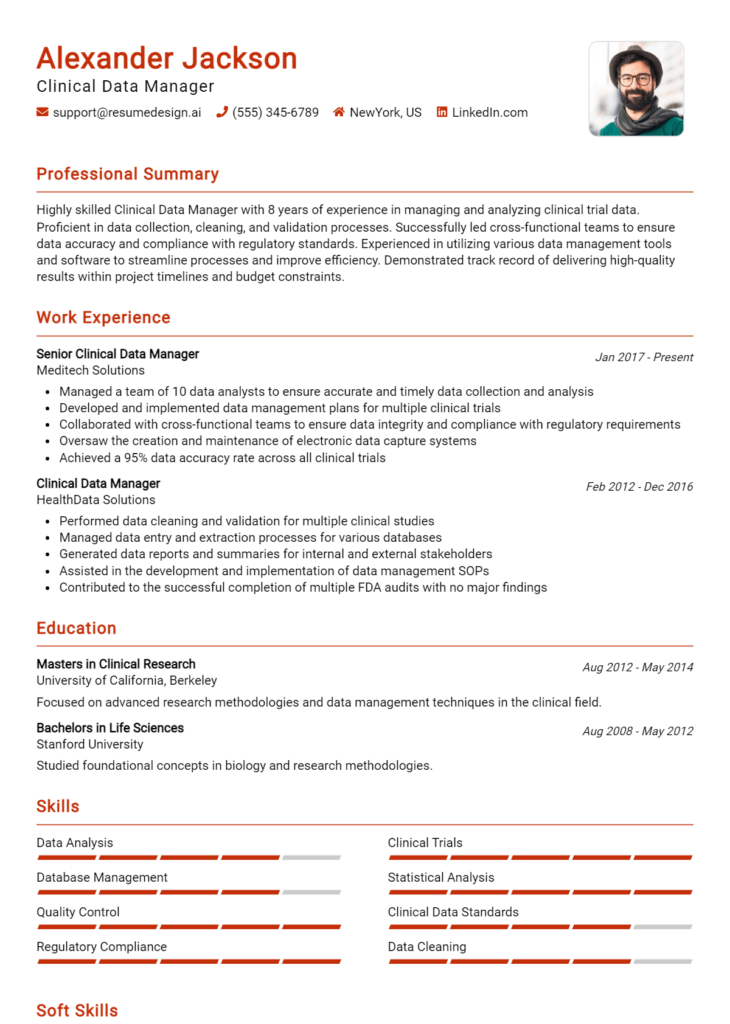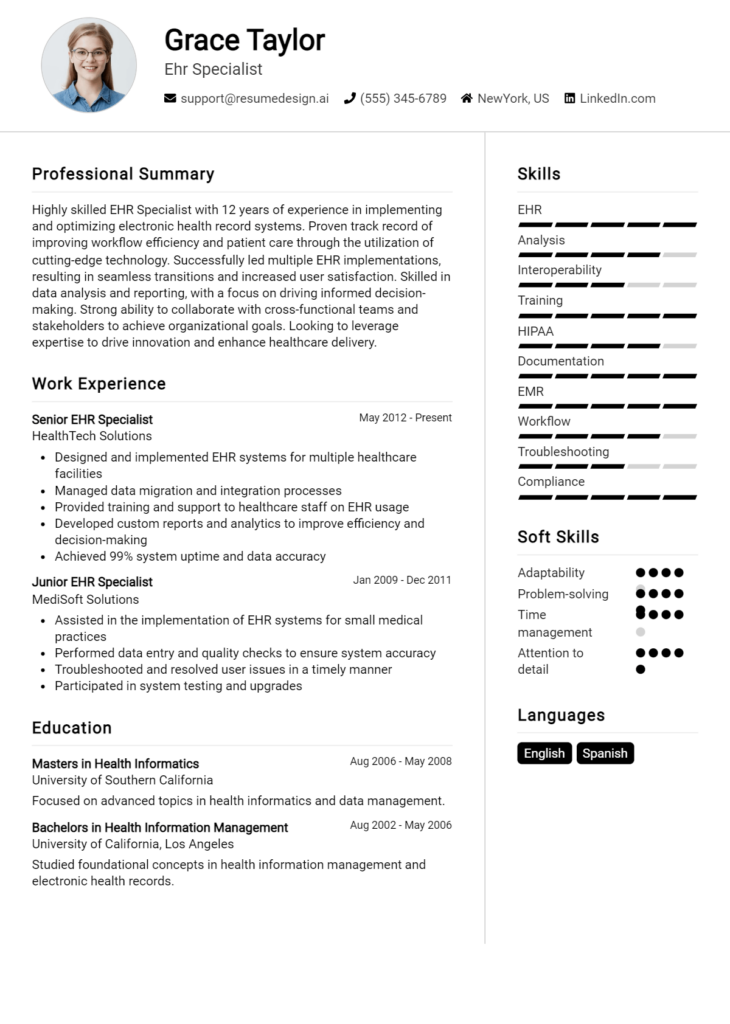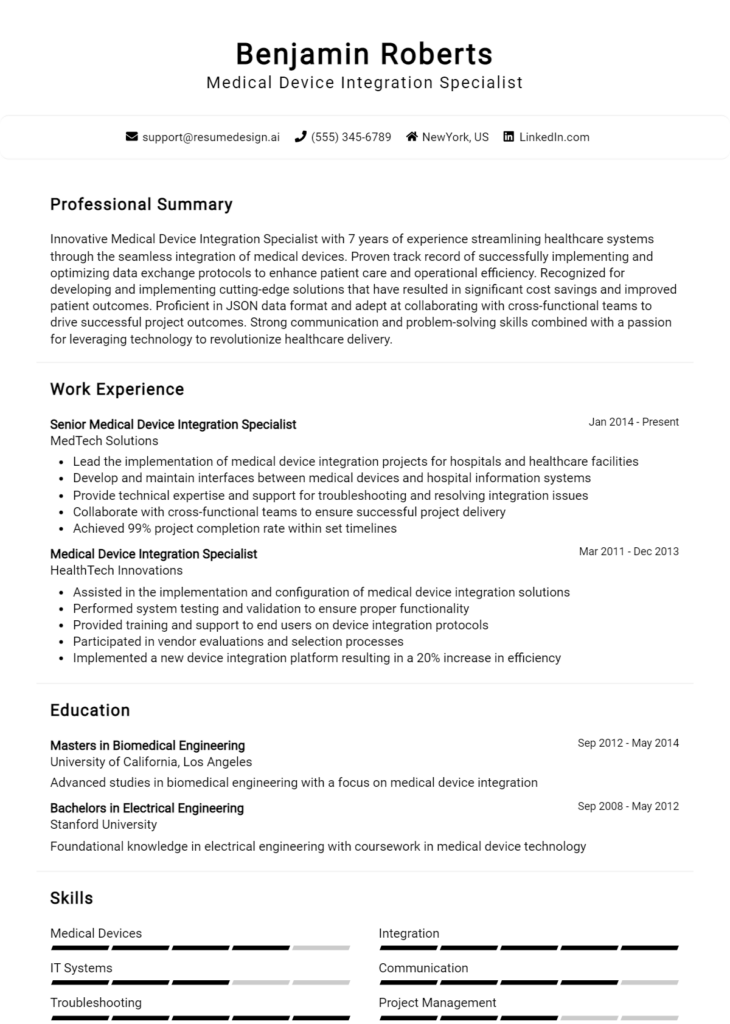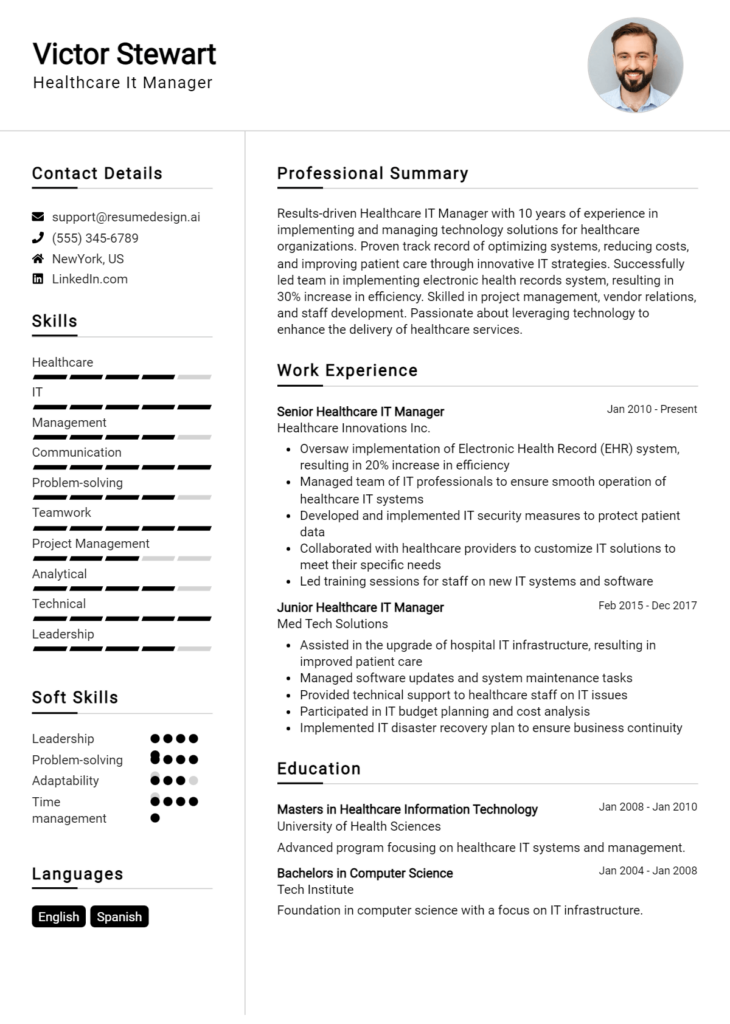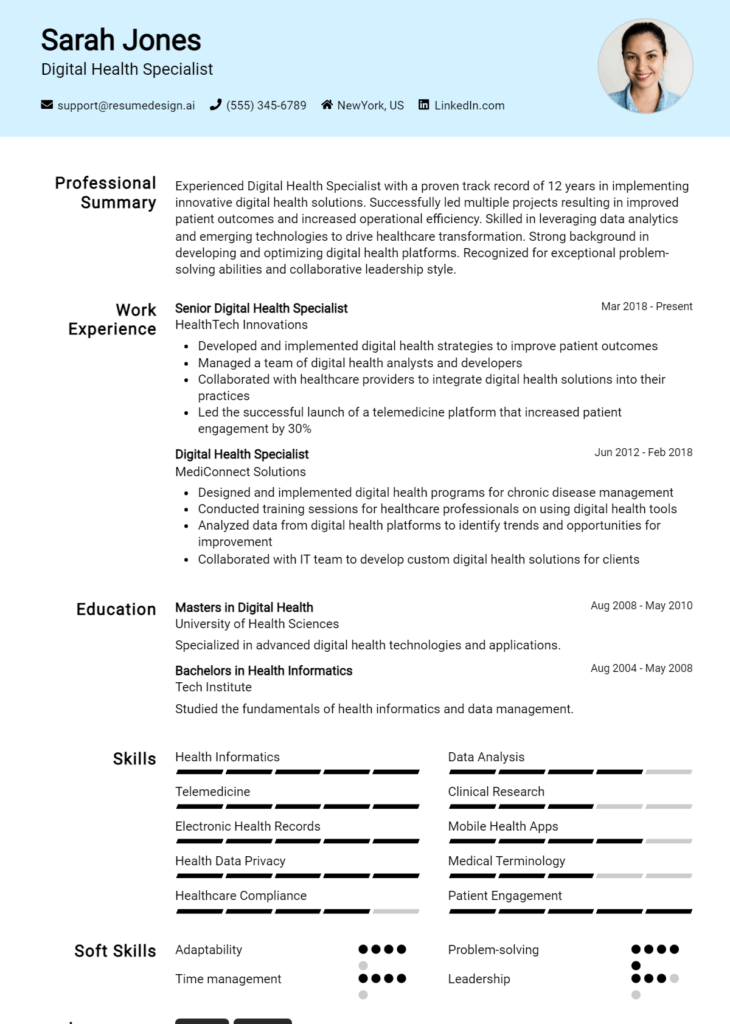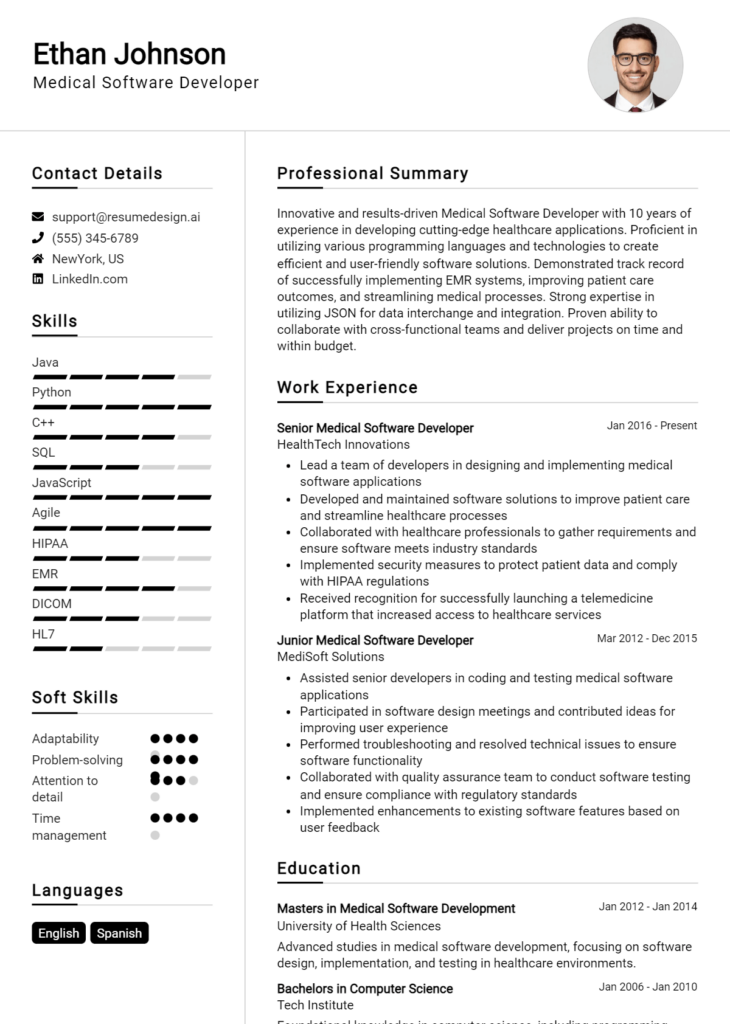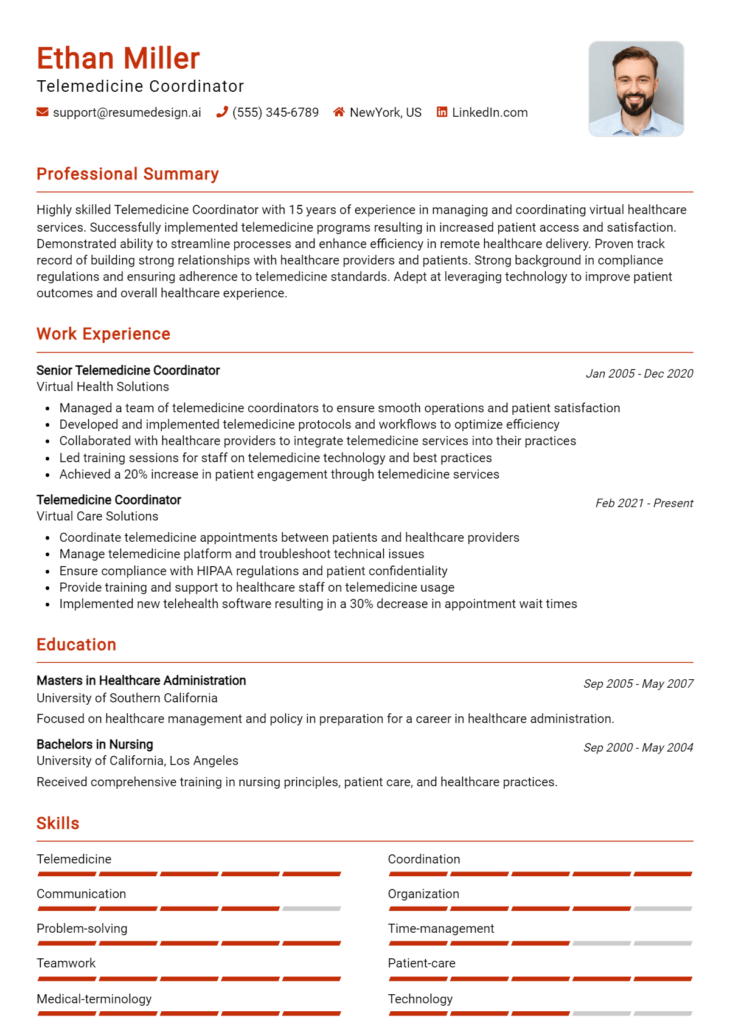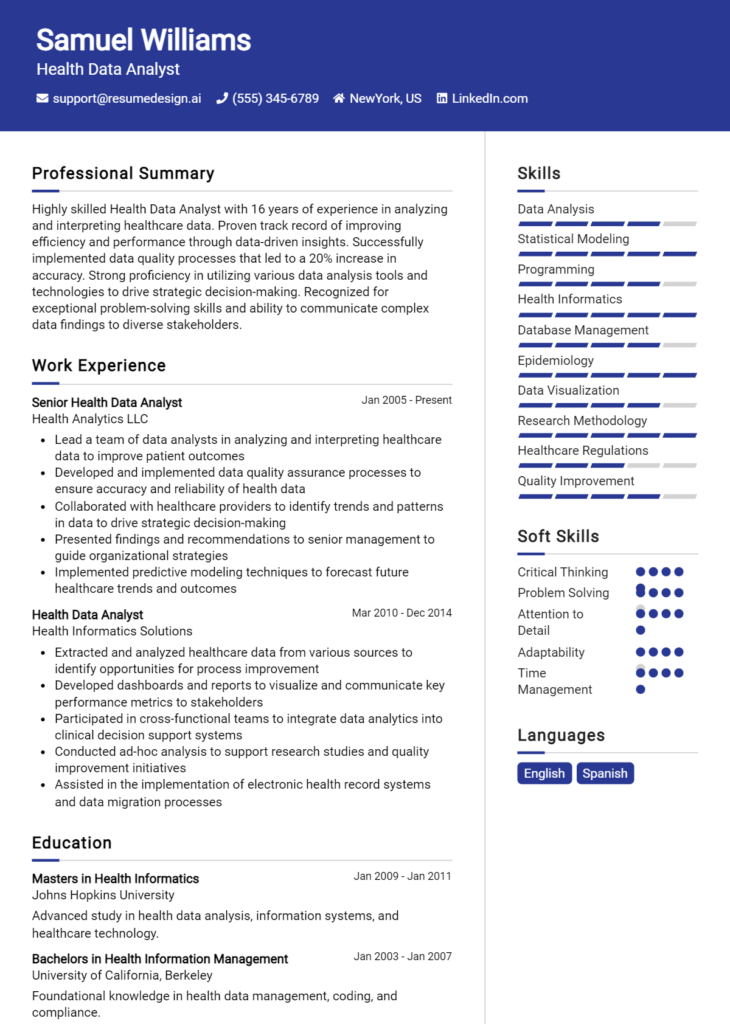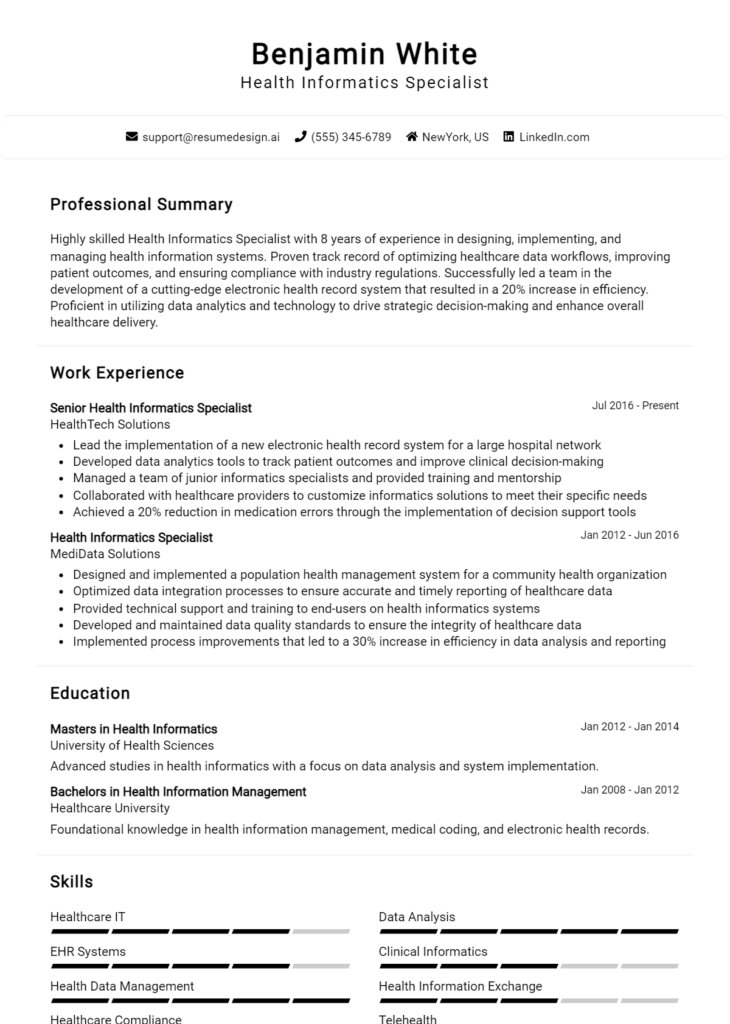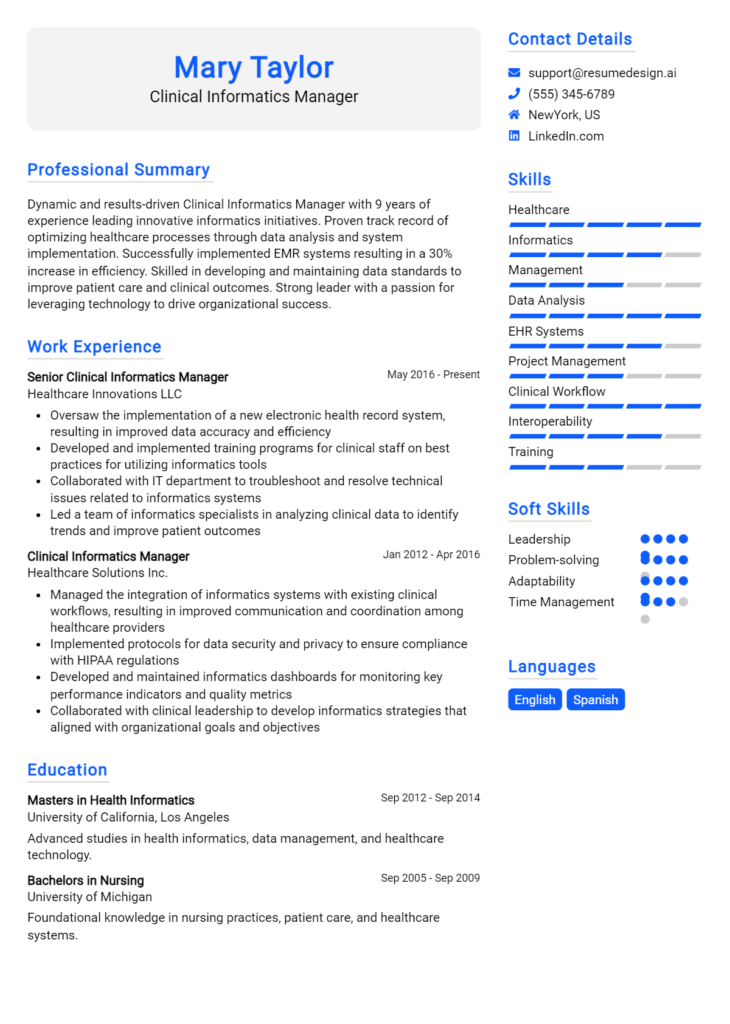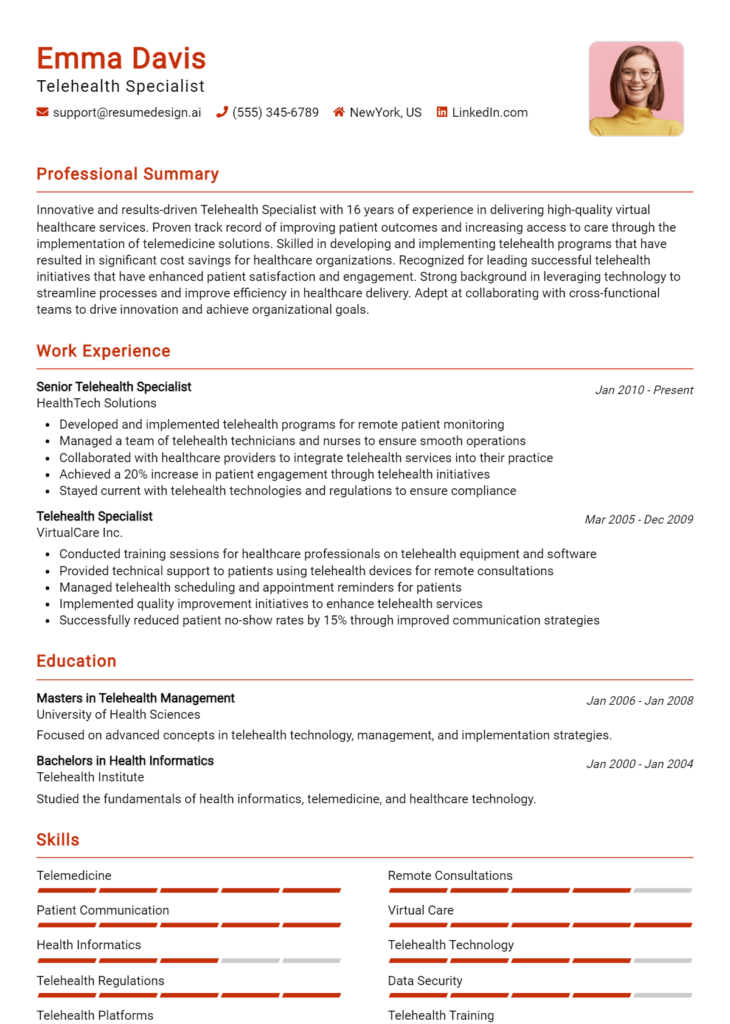Health Information Technician Core Responsibilities
Health Information Technicians play a vital role in managing and safeguarding patient data within healthcare organizations. Their core responsibilities include organizing and maintaining health information databases, ensuring data accuracy and confidentiality, and collaborating with medical staff to facilitate smooth information flow across departments. Essential skills encompass technical proficiency in health information systems, strong operational capabilities, and adept problem-solving abilities. These competencies enhance organizational efficiency and contribute to delivering quality patient care. A well-structured resume highlighting these qualifications can effectively demonstrate a candidate's fit for this crucial position.
Common Responsibilities Listed on Health Information Technician Resume
- Maintaining and updating patient health records in electronic systems.
- Ensuring compliance with health information regulations and standards.
- Conducting regular audits of health information for accuracy.
- Collaborating with healthcare providers to clarify documentation.
- Managing data entry and retrieval processes efficiently.
- Training staff on health information management software.
- Implementing security measures to protect patient data.
- Assisting in the development of health information policies.
- Generating reports for healthcare administration and regulatory bodies.
- Providing support for billing and insurance processes.
- Participating in electronic health record (EHR) implementation projects.
- Addressing and resolving health information discrepancies.
High-Level Resume Tips for Health Information Technician Professionals
A well-crafted resume is essential for Health Information Technician professionals, as it serves as the first impression a candidate makes on potential employers. In a competitive job market, your resume must effectively showcase your skills, experiences, and achievements to stand out among other applicants. A strong resume not only highlights your qualifications but also reflects your understanding of the healthcare industry and its specific requirements. This guide will provide practical and actionable resume tips specifically tailored for Health Information Technician professionals, helping you to create a document that captures the attention of hiring managers.
Top Resume Tips for Health Information Technician Professionals
- Tailor your resume to match the specific job description, emphasizing keywords and phrases that align with the role.
- Highlight relevant experience in health information management, medical coding, or electronic health records.
- Quantify your achievements where possible, using numbers to demonstrate the impact of your work (e.g., "Improved data accuracy by 30%").
- Showcase industry-specific skills such as familiarity with coding systems (ICD-10, CPT) and electronic health record (EHR) software.
- Include certifications and licenses relevant to the field, such as Registered Health Information Technician (RHIT) or Certified Coding Specialist (CCS).
- Utilize a clean and professional format that enhances readability and ensures key information stands out.
- Incorporate a summary statement at the top that highlights your expertise and career goals within health information technology.
- Be concise and focus on the most relevant information, typically limiting your resume to one or two pages.
- Proofread your resume multiple times to eliminate any spelling or grammatical errors that could detract from your professionalism.
Implementing these tips can significantly increase your chances of landing a job in the Health Information Technician field. By creating a tailored and polished resume, you present yourself as a qualified and professional candidate, ready to meet the demands of the healthcare industry. A strong resume not only opens doors but also sets the stage for successful interviews, ultimately leading to a rewarding career in health information management.
Why Resume Headlines & Titles are Important for Health Information Technician
In the competitive field of health information technology, the importance of resume headlines and titles cannot be overstated. A well-crafted headline or title serves as the first impression a hiring manager has of a candidate, effectively summarizing their key qualifications and drawing attention to their application. For Health Information Technicians, a strong headline can encapsulate essential skills and experiences in a concise, impactful phrase, making it easier for recruiters to quickly assess a candidate's fit for the role. Thus, creating a relevant and compelling headline is crucial for standing out in a crowded job market.
Best Practices for Crafting Resume Headlines for Health Information Technician
- Keep it concise—aim for one impactful phrase.
- Make it role-specific by including key terms related to health information technology.
- Highlight your most relevant skills or certifications.
- Use strong action verbs or adjectives to convey confidence.
- Tailor the headline to match the job description.
- Avoid jargon that may not be understood by all hiring managers.
- Focus on your unique value proposition to set yourself apart.
- Consider including years of experience or notable achievements.
Example Resume Headlines for Health Information Technician
Strong Resume Headlines
Certified Health Information Technician with 5+ Years of Experience in Electronic Health Records Management
Detail-Oriented Health Information Specialist Skilled in Data Analysis and Compliance
Experienced Health Information Technician with Expertise in ICD-10 Coding and Patient Data Management
Weak Resume Headlines
Health Technician Seeking Job
Resume of a Health Information Professional
Strong resume headlines are effective because they convey specific qualifications and relevant experience that align with the job requirements, making it easier for hiring managers to identify a candidate's suitability at a glance. In contrast, weak headlines lack specificity and fail to communicate the unique strengths of the candidate, leaving hiring managers unimpressed and potentially overlooking qualified applicants. A compelling headline can make all the difference in capturing attention and prompting further review of the resume.
Writing an Exceptional Health Information Technician Resume Summary
A well-crafted resume summary is crucial for a Health Information Technician, as it serves as the first impression a hiring manager will have of you. This brief statement encapsulates your key skills, relevant experience, and notable accomplishments, allowing you to quickly capture the attention of potential employers. A strong summary should be concise and impactful, tailored specifically to the job you are applying for, emphasizing how your qualifications align with the needs of the organization. By presenting your strengths clearly and effectively, you increase your chances of making it past the initial screening and securing an interview.
Best Practices for Writing a Health Information Technician Resume Summary
- Quantify achievements: Use numbers and percentages to showcase your successes.
- Focus on relevant skills: Highlight specific technical and soft skills pertinent to the role.
- Tailor the summary: Customize your summary for each job application to reflect the job description.
- Keep it concise: Aim for 2-3 sentences that capture the essence of your qualifications.
- Use industry keywords: Incorporate terms from the job posting to pass Applicant Tracking Systems (ATS).
- Showcase certifications: Mention relevant certifications that enhance your candidacy.
- Highlight experience: Emphasize years of experience and specific settings where you've worked (e.g., hospitals, clinics).
- Convey passion: Briefly express your commitment to maintaining high standards in health information management.
Example Health Information Technician Resume Summaries
Strong Resume Summaries
Detail-oriented Health Information Technician with over 5 years of experience in managing electronic health records (EHR) systems. Successfully improved data retrieval time by 30% through streamlined processes and rigorous training programs.
Certified Health Information Technician skilled in coding and billing with a proven track record of reducing claim denials by 25%. Adept at collaborating with healthcare teams to ensure compliance and accuracy in patient data management.
Dedicated Health Information Technician with expertise in data analysis and quality assurance. Achieved a 95% accuracy rate in medical coding audits, enhancing the department's overall efficiency and compliance standards.
Proficient Health Information Technician with 7 years of experience in healthcare administration. Spearheaded the implementation of a new electronic documentation system that increased staff efficiency by 20% within the first quarter.
Weak Resume Summaries
Health Information Technician with experience in the field. Looking for a job where I can use my skills.
Detail-oriented professional seeking to apply my knowledge in health information management.
Experienced technician interested in opportunities in healthcare and data management.
The strong resume summaries are effective because they include specific achievements, quantifiable results, and relevant skills that directly relate to the Health Information Technician role. They demonstrate the candidate's ability to contribute positively to the organization. In contrast, the weak summaries lack detail, specificity, and measurable outcomes, making them too generic and less compelling for hiring managers. Strong summaries provide a clear picture of the candidate's capabilities and value, while weak summaries fail to engage or inform effectively.
Work Experience Section for Health Information Technician Resume
The work experience section of a Health Information Technician resume is vital as it serves as a comprehensive overview of a candidate's practical skills and accomplishments in the field. This section not only highlights the technical expertise required for managing and maintaining health information systems but also showcases the candidate's ability to lead teams and produce high-quality results. By quantifying achievements and ensuring alignment with industry standards, candidates can effectively demonstrate their value to potential employers, making a compelling case for their suitability for the role.
Best Practices for Health Information Technician Work Experience
- Emphasize technical skills relevant to health information management, such as data entry, coding, and software proficiency.
- Use quantifiable metrics to illustrate achievements, such as percentage increases in efficiency or accuracy.
- Highlight collaboration with healthcare professionals and teams to showcase communication and teamwork skills.
- Focus on leadership roles, especially if you have trained or managed junior staff.
- Align your experiences with industry standards and best practices to demonstrate knowledge of compliance and regulations.
- Tailor each entry to the specific job you are applying for, emphasizing the most relevant experiences.
- Incorporate action verbs to convey a sense of initiative and impact.
- Provide context for your achievements to help employers understand the significance of your contributions.
Example Work Experiences for Health Information Technician
Strong Experiences
- Implemented a new electronic health record (EHR) system that improved patient data retrieval speed by 40%, enhancing overall departmental efficiency.
- Led a team of five in a project to reduce coding errors, resulting in a 25% decrease in billing discrepancies over six months.
- Developed and maintained a comprehensive training program for new staff, increasing team productivity by 30% and reducing onboarding time.
- Collaborated with clinical staff to streamline data entry processes, achieving a 15% reduction in data entry time while maintaining high data accuracy rates.
Weak Experiences
- Responsible for entering data into the system.
- Worked on various projects with little impact on the department.
- Helped colleagues with their tasks occasionally.
- Participated in meetings about health information management.
The examples provided illustrate a clear distinction between strong and weak experiences. Strong experiences are characterized by specific, quantifiable outcomes and demonstrate a proactive approach, showcasing leadership and collaboration within a team context. In contrast, weak experiences lack detail, fail to highlight accomplishments, and present vague responsibilities that do not convey a meaningful impact or relevance to the role of a Health Information Technician.
Education and Certifications Section for Health Information Technician Resume
The education and certifications section of a Health Information Technician resume plays a crucial role in showcasing a candidate's academic achievements, industry-relevant certifications, and commitment to continuous professional development. This section not only highlights the foundational knowledge gained through formal education but also emphasizes specialized training and certifications that enhance a candidate's credibility in the healthcare field. By providing detailed information about relevant coursework and recognized credentials, candidates can effectively demonstrate their alignment with job requirements and their readiness to contribute to the healthcare team.
Best Practices for Health Information Technician Education and Certifications
- Include all relevant degrees, such as an Associate's or Bachelor's in Health Information Technology.
- List industry-recognized certifications, like Registered Health Information Technician (RHIT) or Certified Coding Specialist (CCS).
- Provide details about relevant coursework that directly pertains to health information management.
- Highlight any continuing education courses or workshops attended to show ongoing professional development.
- Use clear and concise language to describe your qualifications and avoid jargon.
- Organize the section chronologically or by relevance to make it easy for hiring managers to follow.
- Include the names of institutions and dates of graduation or certification to establish credibility.
- Tailor this section to align with specific job descriptions to increase relevance.
Example Education and Certifications for Health Information Technician
Strong Examples
- Associate of Applied Science in Health Information Technology, XYZ Community College, Graduated May 2021
- Registered Health Information Technician (RHIT), American Health Information Management Association, Certified July 2021
- Introduction to Medical Coding, Online Course, Completed April 2022
- Bachelor of Science in Health Information Management, ABC University, Expected Graduation December 2023
Weak Examples
- Bachelor of Arts in English Literature, University of Somewhere, Graduated May 2018
- Certification in Basic Computer Skills, Completed January 2015
- High School Diploma, Local High School, Graduated June 2014
- Outdated CPR Certification, Expired December 2020
The strong examples are considered effective because they directly relate to the Health Information Technician role, showcasing relevant degrees and certifications that align with industry standards. These candidates demonstrate an ongoing commitment to education and professional growth, making them more appealing to employers. On the other hand, the weak examples fail to establish relevance to the field, as they either pertain to unrelated fields of study or include outdated and irrelevant certifications, which do not contribute to the qualifications necessary for the role of a Health Information Technician.
Top Skills & Keywords for Health Information Technician Resume
As a Health Information Technician, possessing the right skills is crucial for success in this dynamic and detail-oriented role. Employers look for candidates who not only have a solid understanding of health information systems and data management but also demonstrate strong interpersonal and organizational abilities. A well-crafted resume that highlights both hard and soft skills can significantly enhance your job prospects, showcasing your qualifications and readiness to contribute to healthcare teams. By emphasizing these skills, you can illustrate your capacity to ensure the accuracy, privacy, and accessibility of vital patient information, which is essential for effective healthcare delivery.
Top Hard & Soft Skills for Health Information Technician
Soft Skills
- Attention to detail
- Communication skills
- Problem-solving abilities
- Time management
- Team collaboration
- Adaptability
- Critical thinking
- Ethical judgment
- Organization skills
- Customer service orientation
Hard Skills
- Knowledge of health information systems
- Proficiency in medical coding and billing
- Familiarity with electronic health records (EHR) systems
- Data analysis and management
- Understanding of HIPAA regulations
- Experience with database management
- Medical terminology expertise
- Data entry and transcription skills
- Statistical analysis
- Proficiency in Microsoft Office Suite
By integrating these skills into your resume, along with your relevant work experience, you can create a compelling profile that stands out to potential employers in the healthcare sector.
Stand Out with a Winning Health Information Technician Cover Letter
Dear [Hiring Manager's Name],
I am writing to express my interest in the Health Information Technician position at [Company Name], as advertised on [where you found the job listing]. With a strong background in medical coding, data management, and a commitment to maintaining the integrity of health information, I am excited about the opportunity to contribute to your team and support the delivery of quality healthcare services.
In my previous role at [Previous Company Name], I successfully managed electronic health records (EHR) and ensured compliance with HIPAA regulations. My attention to detail and proficiency in medical coding systems, including ICD-10 and CPT, allowed me to improve data accuracy and streamline information retrieval processes. I am adept at utilizing various software systems to input, maintain, and analyze patient data, which I believe will be an asset to [Company Name] in optimizing operational efficiency and enhancing patient care.
Beyond my technical skills, I pride myself on my ability to communicate effectively with healthcare professionals and patients alike. I understand the importance of providing clear and concise information while respecting patient confidentiality. My dedication to continuous professional development has also equipped me with the latest industry knowledge, ensuring that I remain current with evolving healthcare regulations and technology trends.
I am eager to bring my expertise and passion for health information management to [Company Name]. I am confident that my background and skills align well with the goals of your organization. Thank you for considering my application. I look forward to the opportunity to discuss how I can contribute to your team and support the mission of delivering high-quality healthcare.
Sincerely,
[Your Name]
[Your Contact Information]
Common Mistakes to Avoid in a Health Information Technician Resume
When crafting a resume as a Health Information Technician, it's essential to highlight your skills and experiences effectively. However, many candidates make common mistakes that can diminish their chances of landing an interview. By being aware of these pitfalls, you can enhance your resume and present yourself as a strong candidate in the healthcare field. Here are some common mistakes to avoid in your resume:
Ignoring Keywords: Failing to include relevant keywords from the job description can lead to your resume being filtered out by Applicant Tracking Systems (ATS). Make sure to incorporate industry-specific terms and required skills.
Overloading with Jargon: While it's important to demonstrate your expertise, using excessive technical jargon can confuse hiring managers who may not be familiar with every term. Strive for a balance between professionalism and clarity.
Neglecting Formatting: A cluttered or inconsistent format can make your resume hard to read. Use clear headings, bullet points, and a consistent font to improve readability and ensure important information stands out.
Lack of Quantifiable Achievements: Merely listing job duties without showcasing your accomplishments can weaken your resume. Use metrics and specific examples to demonstrate how you added value in previous roles.
Using an Objective Statement: Objective statements often focus on what you want from the job rather than what you can offer. Instead, consider using a summary statement that highlights your skills and contributions.
Failing to Tailor Your Resume: Sending out a generic resume can be detrimental. Tailor your resume for each application by emphasizing the experiences and skills that align with the specific job requirements.
Including Irrelevant Information: Including unrelated work experience or outdated skills can clutter your resume. Focus on experiences that directly relate to health information technology to maintain relevance.
Neglecting Proofreading: Spelling and grammatical errors can create a negative impression and suggest a lack of attention to detail. Always proofread your resume multiple times or ask someone else to review it before submission.
Conclusion
In summary, the role of a Health Information Technician is crucial in managing and safeguarding patient data. These professionals ensure that health records are accurate, accessible, and secure, playing a vital part in the healthcare system. Key responsibilities include coding medical diagnoses and procedures, maintaining databases, and ensuring compliance with healthcare regulations. As technology continues to evolve, the demand for skilled technicians grows, making it essential to stay updated with industry trends and best practices.
As you reflect on your career as a Health Information Technician, take a moment to review your resume to ensure it highlights your skills and experiences effectively. A polished resume can set you apart in a competitive job market. To assist you in this process, consider utilizing valuable resources such as resume templates, a user-friendly resume builder, proven resume examples, and tailored cover letter templates. These tools can help you create a standout application that showcases your qualifications and helps you secure your next opportunity in the field. Don't wait—start enhancing your professional presence today!

